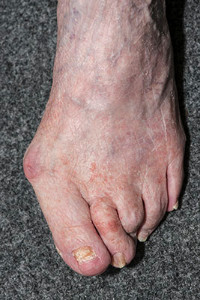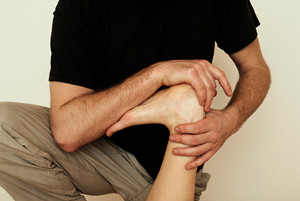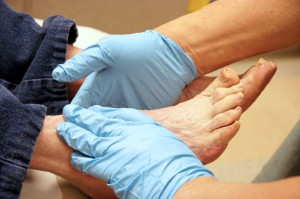
 With warmer weather now upon us, many children make a return to outdoor sports and activities. Many parents may eventually face the issue of their children experiencing heel pain. In adolescents, heel pain is often caused by Sever’s disease. Pain is typically described as being at the back of the heel; this is where the growth plate has not fully developed yet. Sever’s disease is thought to occur because of a mismatch in the growth of the heel bones to the calf muscle and Achilles tendon. Rest and pain relief are key parts of treatment.
With warmer weather now upon us, many children make a return to outdoor sports and activities. Many parents may eventually face the issue of their children experiencing heel pain. In adolescents, heel pain is often caused by Sever’s disease. Pain is typically described as being at the back of the heel; this is where the growth plate has not fully developed yet. Sever’s disease is thought to occur because of a mismatch in the growth of the heel bones to the calf muscle and Achilles tendon. Rest and pain relief are key parts of treatment.
Making sure that your children maintain good foot health is very important as they grow. If you have any questions, contact Dr. Russell J. Ellicott of Augusta Foot Center. Dr. Ellicott can provide the care you need to keep you pain-free and on your feet.
Keeping Children's Feet Healthy
Having healthy feet during childhood can help prevent medical problems later in life, namely in the back and legs. As children grow, their feet require different types of care. Here are some things to consider...
Although babies do not walk yet, it is still very important to take care of their feet.
Avoid putting tight shoes or socks on his or her feet.
Allow the baby to stretch and kick his or her feet to feel comfortable.
As a toddler, kids are now on the move and begin to develop differently. At this age, toddlers are getting a feel for walking, so don’t be alarmed if your toddler is unsteady or ‘walks funny’.
As your child gets older, it is important to teach them how to take care of their feet.
Show them proper hygiene to prevent infections such as fungus.
Be watchful for any pain or injury.
Have all injuries checked by a doctor as soon as possible.
Comfortable, protective shoes should always be worn, especially at play.
If you have any questions please feel free to contact our office located in Augusta, GA. We offer the newest diagnostic and treatment technologies for all your foot and ankle needs.
Read more about What to Do to Keep Your Child’s Feet Healthy Regardless of the season, bunions and the pain associated with them plague athletes of all fields. Skiers, hockey players, basketball players, and other athletes involved in running sports are all susceptible to developing the condition. A bunion is characterized as a painful swelling of soft tissue and bone enlargement over the inner side of the ball of the big toe joint. With progression, the condition can become arthritic and may be accompanied by pain and the inability to wear shoes and walk comfortably. Treatment for bunions depends on the severity of the condition. In many cases, orthotics and wider fitting shoes can help, whereas more severe cases may call for surgery.
Regardless of the season, bunions and the pain associated with them plague athletes of all fields. Skiers, hockey players, basketball players, and other athletes involved in running sports are all susceptible to developing the condition. A bunion is characterized as a painful swelling of soft tissue and bone enlargement over the inner side of the ball of the big toe joint. With progression, the condition can become arthritic and may be accompanied by pain and the inability to wear shoes and walk comfortably. Treatment for bunions depends on the severity of the condition. In many cases, orthotics and wider fitting shoes can help, whereas more severe cases may call for surgery.
If you are suffering from bunions, contact Dr. Russell J. Ellicott of Augusta Foot Center. Dr. Ellicott can provide the care you need to keep you pain-free and on your feet.
What is a Bunion?
A bunion is formed of swollen tissue or an enlargement of boney growth, usually located at the base joint of the toe that connects to the foot. The swelling occurs due to the bones in the big toe shifting inward, which impacts the other toes of the foot. This causes the area around the base of the big toe to become inflamed and painful.
Why do Bunions Form?
Genetics – susceptibility to bunions are often hereditary
Stress on the feet – poorly fitted and uncomfortable footwear that places stress on feet, such as heels, can cause bunions to form
How are Bunions Diagnosed?
Doctors often perform two tests – blood tests and x-rays – when trying to diagnose bunions, especially in the early stages of development. Blood tests help determine if the foot pain is being caused by something else, such as arthritis, while x-rays provide a clear picture of your bone structure to your doctor.
How are Bunions Treated?
If you have any questions, please feel free to contact our office located in Augusta, GA. We offer the newest diagnostic and treatment technologies for all your foot care needs.
Read more about Bunions While wearing proper-fitting shoes is a well-known tip for avoiding foot pain, sometimes it may not be enough. If your shoes are comfortable and fit properly to your feet and you’re still experiencing pain, trying certain foot exercises and stretches may help. Rolling a tennis ball underneath the toes is a great way to massage the entire foot. Using your hands and fingers to stretch between the toes can also give relief. Other exercises include repeating heel and toe raises as well as toegrips, or picking up a pencil using only one foot.
While wearing proper-fitting shoes is a well-known tip for avoiding foot pain, sometimes it may not be enough. If your shoes are comfortable and fit properly to your feet and you’re still experiencing pain, trying certain foot exercises and stretches may help. Rolling a tennis ball underneath the toes is a great way to massage the entire foot. Using your hands and fingers to stretch between the toes can also give relief. Other exercises include repeating heel and toe raises as well as toegrips, or picking up a pencil using only one foot.
Exercising your feet regularly with the proper foot wear is a great way to prevent injuries and build strength. If you have any concerns about your feet, contact Dr. Russell J. Ellicott from Augusta Foot Center. Dr. Ellicott can provide the care you need to keep you pain-free and on your feet.
Exercise for Your Feet
Exercise for your feet can help you gain strength, mobility and flexibility in your feet. They say that strengthening your feet can be just as rewarding as strengthening another part of the body. Your feet are very important, and we often forget about them in our daily tasks. But it is because of our feet that are we able to get going and do what we need to. For those of us fortunate enough to not have any foot problems, it is an important gesture to take care of them to ensure good health in the long run.
Some foot health exercises can include ankle pumps, tip-toeing, toe rises, lifting off the floor doing reps and sets, and flexing the toes. It is best to speak with yDr. Ellicott to determine an appropriate regimen for your needs. Everyone’s needs and bodies are different, and the activities required to maintain strength in the feet vary from individual to individual.
Once you get into a routine of doing regular exercise, you may notice a difference in your feet and how strong they may become.
If you have any questions please feel free to contact one of our office located Augusta, GA. We offer the newest diagnostic and treatment technologies for all your foot and ankle needs.
Read more about Exercise for Your Feet For people who live with diabetes, footcare should be high on the list of concerns related to overall health. Due to constricted blood flow or nerve damage, diabetics need to take extra care to avoid potential foot and leg injuries. Walking barefoot is not typically a good idea, as you may not feel it when you step on something sharp. Proper inspection is also very important. Be sure to check your legs and feet for any kind of sores or lesions. Gone unnoticed or untreated, these wounds can quickly become infected and lead to very serious consequences like amputation. Along with daily personal inspection, make sure you have your feet checked often by a podiatrist.
For people who live with diabetes, footcare should be high on the list of concerns related to overall health. Due to constricted blood flow or nerve damage, diabetics need to take extra care to avoid potential foot and leg injuries. Walking barefoot is not typically a good idea, as you may not feel it when you step on something sharp. Proper inspection is also very important. Be sure to check your legs and feet for any kind of sores or lesions. Gone unnoticed or untreated, these wounds can quickly become infected and lead to very serious consequences like amputation. Along with daily personal inspection, make sure you have your feet checked often by a podiatrist.
Diabetic foot care is important in preventing foot ailments such as ulcers. If you are suffering from diabetes or have any other concerns about your feet, contact Dr. Russell J. Ellicott from Augusta Foot Center. Dr. Ellicott can provide the care you need to keep you pain-free and on your feet.
Diabetic Foot Care
Diabetes affects millions of people every year. The condition can damage blood vessels in many parts of the body, especially the feet. Because of this, taking care of your feet is essential if you have diabetes, and having a podiatrist help monitor your foot health is highly recommended.
The Importance of Caring for Your Feet
Patients with diabetes should have their doctor monitor their blood levels, as blood sugar levels play such a huge role in diabetic care. Monitoring these levels on a regular basis is highly advised.
It is always best to inform your healthcare professional of any concerns you may have regarding your feet, especially for diabetic patients. Early treatment and routine foot examinations are keys to maintaining proper health, especially because severe complications can arise if proper treatment is not applied.
If you have any questions please feel free to contact our office located in Augusta, GA. We offer the newest diagnostic and treatment technologies for all your foot and ankle needs.
Read more about Diabetic Foot Care